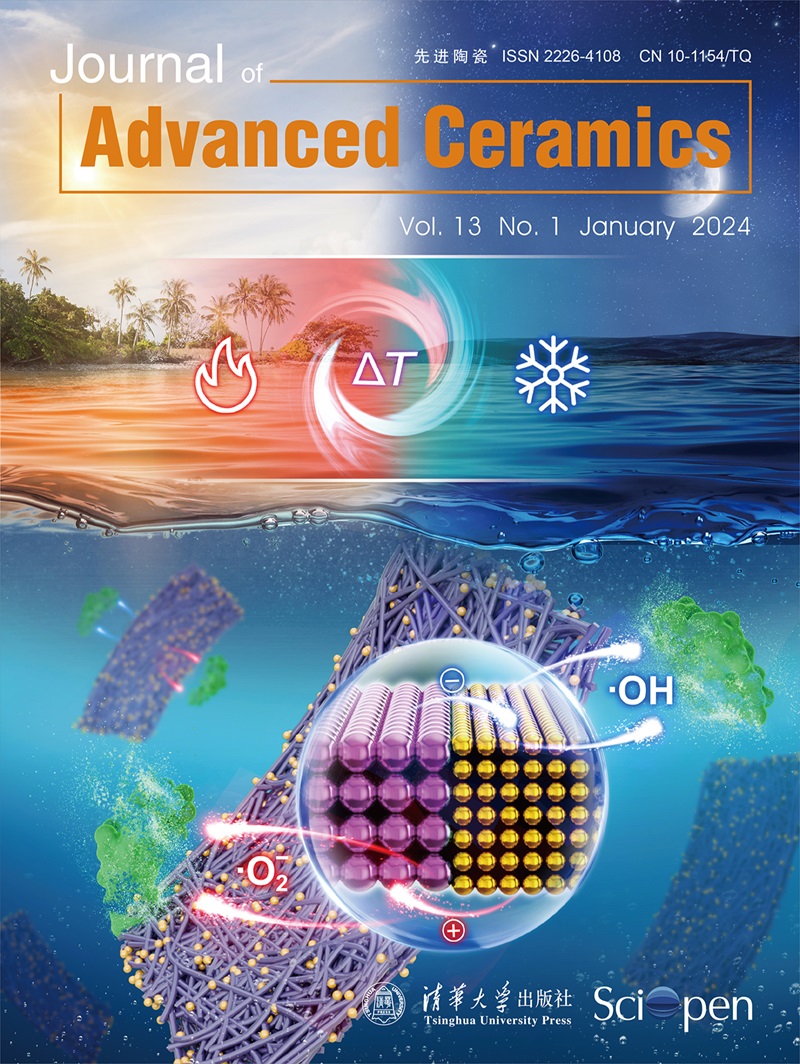Modeling of the process-induced stress, damage, microstructure, and deformation evolution during the pyrolysis process manufacturing CMCs
IF 16.6
1区 材料科学
Q1 MATERIALS SCIENCE, CERAMICS
引用次数: 0
Abstract
An insightful understanding of the formation mechanism of process-inherent defects and deformation is increasingly important for the property evaluation and structural design of ceramic matrix composites (CMCs). For this purpose, a coupled thermal–diffusive–mechanical modeling approach was proposed by considering three important phenomena that occurs during the pyrolysis process for manufacturing CMCs: variations of the physical and mechanical properties of the constituents, generation and diffusion of pyrolysis gas, and multiple thermal deformations. The synergistic effects of these three phenomena on the stress, damage development, microstructural morphology, and process deformation of SiC matrix composites were investigated using finite-element simulations. This new approach was validated by comparing the simulation and experimental results. Significant volume shrinkage of the matrix during the polymer-to-ceramic transformation resulted in large tensile stresses and subsequent highly fragmented microstructure in the CMCs. The pyrolysis-gas-induced expansion on the matrix under damage state may yield a positive process deformation of CMCs at the macroscale, overcoming the effects of the volume shrinkage of the bulk matrix at the microscale. The modeling approach is expected to guide high-quality manufacturing of CMCs and comprehensive studies of structure-processing-property relationships.cmc制造过程中过程诱导应力、损伤、微观结构和变形演化的建模
深入了解陶瓷基复合材料的工艺缺陷和变形的形成机制对陶瓷基复合材料的性能评价和结构设计越来越重要。为此,考虑到cmc制造过程中发生的三个重要现象:组分物理力学性质的变化、热解气体的产生和扩散以及多次热变形,提出了一种热-扩散-力学耦合建模方法。通过有限元模拟研究了这三种现象对SiC基复合材料的应力、损伤发展、显微组织形态和工艺变形的协同作用。通过仿真与实验结果的对比,验证了该方法的有效性。在聚合物到陶瓷的转变过程中,基体的显著体积收缩导致cmc中的大拉伸应力和随后的高度碎片化的微观结构。损伤状态下基体上的热解-气体膨胀在宏观上可以产生正过程变形,克服了微观上基体体积收缩的影响。该建模方法有望指导cmc的高质量制造和结构-加工-性能关系的全面研究。
本文章由计算机程序翻译,如有差异,请以英文原文为准。
求助全文
约1分钟内获得全文
求助全文
来源期刊

Journal of Advanced Ceramics
MATERIALS SCIENCE, CERAMICS-
CiteScore
21.00
自引率
10.70%
发文量
290
审稿时长
14 days
期刊介绍:
Journal of Advanced Ceramics is a single-blind peer-reviewed, open access international journal published on behalf of the State Key Laboratory of New Ceramics and Fine Processing (Tsinghua University, China) and the Advanced Ceramics Division of the Chinese Ceramic Society.
Journal of Advanced Ceramics provides a forum for publishing original research papers, rapid communications, and commissioned reviews relating to advanced ceramic materials in the forms of particulates, dense or porous bodies, thin/thick films or coatings and laminated, graded and composite structures.
 求助内容:
求助内容: 应助结果提醒方式:
应助结果提醒方式:


